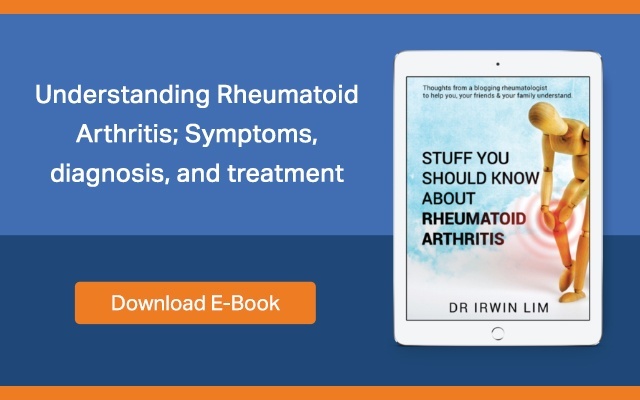12 ways Rheumatoid Arthritis hurts you
Rheumatoid Arthritis is considered first & foremost a joint disease, an arthritis.
Rheumatoid arthritis can start in any joint but most commonly, the smaller joints of the fingers & the wrists are affected. These smaller joints in the hands are the “knuckles”: the metacarpophalangeal joints (MCPJs) and/or the proximal interphalangeal joints (PIPJs).
 The pattern of involvement is described as symmetrical. This means that if 1 joint is swollen and painful on one hand, a similar joint is often (but not always) involved on the other hand.
The pattern of involvement is described as symmetrical. This means that if 1 joint is swollen and painful on one hand, a similar joint is often (but not always) involved on the other hand.
However, like most of the autoimmune diseases, rheumatoid arthritis has wider, systemic effects.
It’s not just a joint problem.
The disease itself can cause other symptoms, apart from
- joint pain, swelling & tenderness. These include:
- Fatigue: can be debilitating & slow to improve
- Stiffness: noted mainly in the morning & after sitting for long periods
- A sensation of weakness
- Rheumatoid Nodules: lumps under the skin found on elbows & other bony surfaces
- Loss of appetite
- Muscle pain
- Depression
- Dryness of the mouth & eyes: known as “sicca” or secondary Sjogren’s syndrome
- In more severe or in untreated disease, organ involvement: includes inflammatory eye disease such as scleritis, lung disease, and inflammation of blood vessels (rheumatoid vasculitis).
- Increase in cardiovascular risks
- Accelerated bone loss, with an increase in osteoporosis
Rheumatologists in general, understandably focus on the joint symptoms, as we know that by arresting joint erosion by early treatment (the window of opportunity), we can effectively prevent a lot of the joint deformity & destruction.
However, sufferers with rheumatoid arthritis often continue to have some of the symptoms listed above even after the joint disease is seemingly controlled.
A comprehensive, multidisciplinary, coordinated approach to the management of this disease would appear to be a good thing. BJC Health continues to develop a Connected Care approach to rheumatoid arthritis.
If you have rheumatoid arthritis, do you suffer with some of the listed symptoms? Apart from medication, what are other components of your current management plan?



